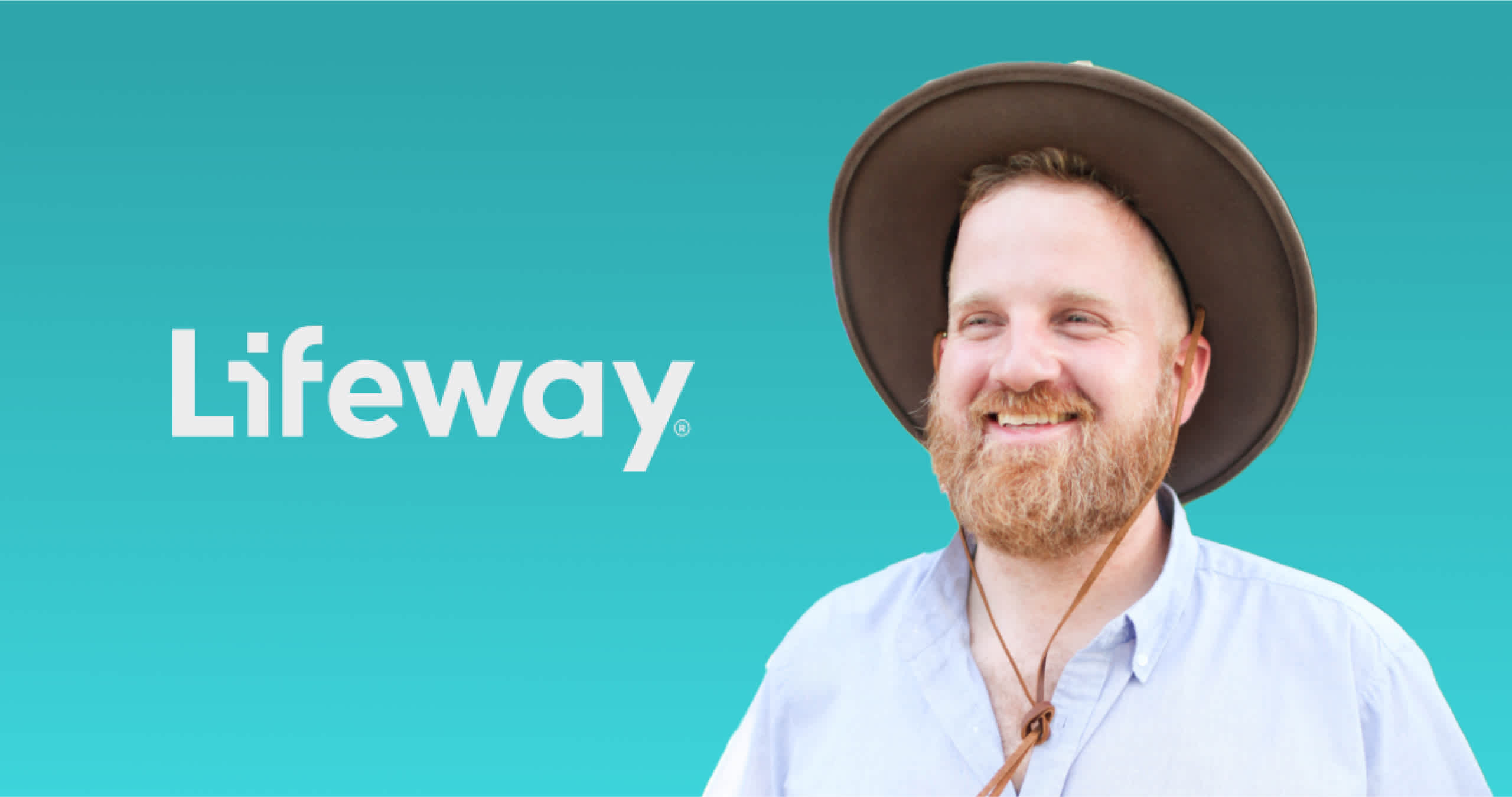Faith & Spirituality
With Lifeway Students Ministry Network, Zac Workun created a five-figure membership to help youth pastors feel less isolated

Lifeway Students Ministry Network is a paid membership site that supports youth pastors in building their ministry while keeping their passion (and sanity) intact.
Topic
Faith & Spirituality
Mighty Plan
The Launch Plan
Offering
Paid Membership
Workshops
Courses
Topic
Faith & Spirituality
Mighty Plan
The Launch Plan
Offering
Paid Membership
Workshops
Courses
Table of Contents
- Starting with a Facebook Group... And finding limitations right away
- Discovering the right platform meant offering more value without more work
- A new membership model with live events, trainings, and curated connections
- Making an investment in doing things that matter
- 3 key takeaways from Lifeway Students Ministry Network’s Story of Awesome
In this article
- Starting with a Facebook Group... And finding limitations right away
- Discovering the right platform meant offering more value without more work
- A new membership model with live events, trainings, and curated connections
- Making an investment in doing things that matter
- 3 key takeaways from Lifeway Students Ministry Network’s Story of Awesome
Tulsa, Oklahoma-based youth minister Zac Workun knew his calling as a youth minister was the right one for him. The fact that it was also isolating and, at times, lonely was something he chalked up to the price he paid for pursuing his purpose.
Until the day that he and his best friend and fellow youth minister Chad Higgins launched their Lifeway Students Ministry Network podcast as an experiment.
Very quickly, he and Chad realized that they were not alone. Their podcast grew rapidly from a regional to a national audience. That’s when Zac had his a-ha moment. His ministry could extend to supporting his fellow youth ministers in honing their craft, strengthening their service, and staying grounded mentally and emotionally in the process:
With that in mind, Zac started looking for an online home for him and his fellow youth ministers.

Starting with a Facebook Group... And finding limitations right away
Zac started by trying to make a community work on a Facebook Group. Almost immediately he saw that on Facebook his members were only asking basic, cursory questions:
These superficial conversations weren’t getting at the topics that resonated so powerfully on the podcast. He wanted to connect more youth ministers to each other in more vulnerable and meaningful ways that would have a richer and more positive impact on their practices and lives. It wasn’t about the quantity of members (something he felt Facebook emphasized) but rather the quality of the connections:
He knew he had to get Lifeway Students Ministry Network off Facebook.
His list of requirements wasn’t particularly crazy. He wanted to be able to share the podcast a few days early, add resources that would help youth ministers get creative solutions to common challenges, and, above all else, ensure his members could build real relationships with each other:
Discovering the right platform meant offering more value without more work
When Zac discovered Mighty Networks, he found his answer. A Mighty Network was different from a Facebook group in a few key ways:
It was off Facebook in a space that would be all their own–away from the noise, clutter, and expectations of social media.
It would allow Zac to use the training and workshops he offered directly in the community for members to meet each other and build relationships naturally just like they would at a real-world conference.
There were more ways to connect members beyond what was possible in his prior group and there was no algorithm that stood between him and communicating with everyone.
And because a Mighty Network was offered on both the web and mobile apps, he wouldn’t have to sacrifice engagement by choosing to run his own branded community.
Zac found quickly that he had made the right call. His members began tapping into each other’s experiences, both in neighboring towns and across the country.
Now he was ready to scale. He was committed to serving his members more deeply with more resources as well as more ways to meet each other. He knew that charging for membership would mean more of his members would commit. As another Mighty Host, Dan Miller put it, “people pay attention to what they pay for.” Zac intuitively knew this as well.

A new membership model with live events, trainings, and curated connections
To keep things simple for prospective members (following a best practice in creating subscription businesses), Zac launched a single membership tier, priced at $19.99 a month or $199 a year. For his current 353 members, this subscription includes:
Weekly Soul Care
Members have the option to reserve a spot in a weekly group video call with their peers, where they can touch base, ask important questions, and provide (and ask for) support and encouragement from each other.
On-Demand Training
Members get access to an archive of over 200 training videos to watch on their own time, with topics from administration to discipleship.
Practical Webinars
Led by a guest speaker, these monthly webinars dive deep into topics like leadership, communication, trauma, discipleship, and event planning.
Digital Resources
Lifeway Students Ministry Network offers new resources monthly that help members to enhance their leadership and enrich their ministries. These resources give followers access to hundreds of ideas, a calendar year’s worth of teaching elements, graphics, games and more.
Exclusive Mastermind Group Matching
These monthly mastermind groups are curated by Zac and his team, matching 8 to 10 youth ministers to each other based on location, experience, and the size of their congregation. Once a month, the group connects virtually via video meetings led by veteran youth ministers, where they can ask questions, exchange experiences, and get closer to achieving their personal and professional goals.
This last benefit of membership–mastermind group matching–has turned out to be the crown jewel of the subscription:
One of the benefits of choosing a Mighty Network was its Groups feature, which enabled Zac to match and run the mastermind groups within his Mighty Network, another feature deepening engagement.
Beyond the matching service, the live events and weekly calendar build habits among Zac’s members in a way that hasn’t created a lot of work for him:

Making an investment in doing things that matter
For Zac, focusing on creating meaningful connections remains the priority, which is how he’s able to support both free and paying members:
And while he started without a plan, he’s confident that as long as his Mighty Network is able to sustain a community of youth pastors in need of resources, members will keep coming back—and bringing more of their fellow youth pastors with them:
3 key takeaways from Lifeway Students Ministry Network’s Story of Awesome
Use your own experience to discover your niche. Zac knew he could be an effective mentor for his community because he understood first-hand how important, yet lonely and isolating youth ministry can be. Consider your own circumstances, identity, and background when defining your community purpose and the initial members you want to target first.
Choose quality over quantity. Early on, Zac made the decision to drive a deeper connection among hundreds of members instead of defining success as having thousands of members. It’s easier to build a valuable experience for a smaller group of people (especially if you are starting from scratch), plus it sets you up to charge a premium price of $199 or more per year.
Strike a balance between value and what’s manageable for you. Once Zac and his team ditched their Facebook group, they knew they needed to differentiate what they were building into their membership model from what someone could get for free from social media. Look for ways to offer people value through a weekly calendar of events, smaller groups, and more, all while keeping an eye on making it manageable for you to run over time. There aren’t extra points for building something that you can’t sustain.
More like this
Start your own Mighty Network today
Start your free trial
14 Days. No Credit Card Required.



